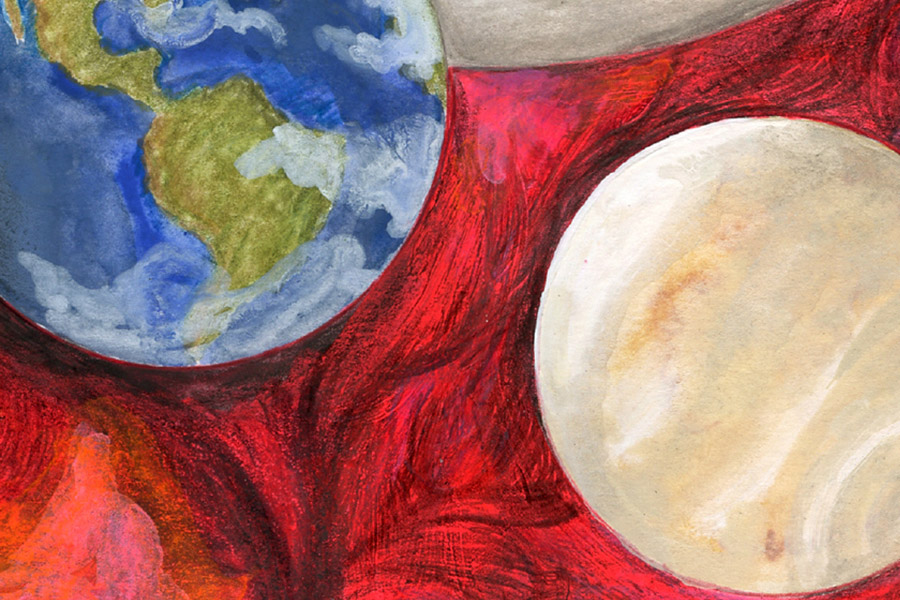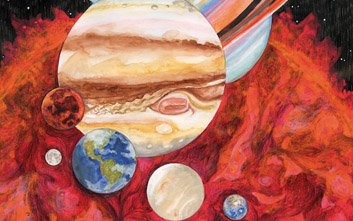Space is an inescapable lure to our psyche. It hangs over us, quite literally; and even as we explore further and further into the outer reaches of our galaxy, it remains a mystery. As such, what lies beyond the atmosphere is a continual point of reference and reflection for artists and musicians, long before Ground Control suggested Major Tom take his protein pills and put his helmet on.
Planetarium is the culmination of a long running project, a collaboration between Sufjan Stevens, composer Nico Muhly, Bryce Dessner of The National and producer/percussionist James McAlister. A 17 track concept album, or song cycle, Planetarium has more to do with Holst’s famous suite than with Bowie.

Written by an interstellar supergroup with compositional perfection, Planetarium is a guided tour of our immediate universe and its celestial bodies.
The original collaboration began a few years ago, when the Dutch concert hall Muziekgebouw Eindhoven commissioned Muhly to create a new piece. Drawing on existing friendships with both Stevens and Bryce, Stevens then introduced long time collaborator McAlister to the mix. The four describe a sort of natural synergy in working together; if Muhly’s world is one of progressive classical music, Bryce’s virtuosic skill straddles both the classical and contemporary styles at play.
Stevens feels like a natural component to the project, even before you hear the record. In his almost two decades long career, Sufjan Stevens has yet to touch anything that did not challenge our conception of imagination or musicality. And Stevens describes McAlister as “like glue” to the group; underpinning the other three with percussive and electronic elements.
According to Bryce, “seven trombones was enough to lure Sufjan into it.” But Planetarium reaches beyond just nods to orchestral, symphonic elements. The concept also goes further than a simple exploration of space. Brass chorales, string quartets and ethereal choirs encompass an exploration of humanity; one small consciousness in one giant universe.
Previously, Stevens has beautifully imbued everyday symbolism with near religious meaning. Now considering astrology and mythology, the symbolic nature and influence we have prescribed to celestial bodies is fitting to this grand musical journey.
Opening with the piano driven Neptune, this first track is instantly recognisable for Stevens’ influence; light, sweet and melancholic. But as the song progresses, it expands into the cinematic style that is likely Bryce’s touch, alongside classical instrumentation and phrasing. Vocal lines briefly shift and swell between the top melody of the orchestra, a light introduction to Planetarium’s grandeur.
Jupiter, titled for the largest planet in our solar system and synonymous with the king of the gods in ancient mythology, side steps the stern intensity you might have expected. It does however introduce the electronic textures which take their place in the arrangement, adding another dimension to Planetarium.
Cascading digital tones and a vocoder almost play too much to the galactic theme, but as they assume the places of the strings and the brass, the song transforms. Juddering, industrial bass lends weight instead of a bass drum, and the vocoder becomes a celestial choir.
In a number of ways, Planetarium answers the questions that have edged recorded music over the last few years. For one, it’s a 17 track album – a concept album no less – interlaced with interludes, instrumentals and accented with epic tracks, like the 15 minute long Earth.
Forging into new territory, musically and conceptually, there is no denying that it is braver than most artists would hazard.
It is truly a listening piece. The majority is dramatic and evocative, touching on ambient electronic music as well as the classical. But among the more vocal-lead tracks are some real beauties. Pluto in particular is a gorgeous, tripping melody, breathing between the heavier pieces. String sections bring out the wonder of new worlds, echoing classic cinema like 2001: A Space Odyssey.
On the other end of the spectrum, Saturn (released earlier this year) is nearly a 90s intergalactic dance experience.
However, the main point is that it isn’t. Planetarium may touch on those elements but it never drops into cliched territory or away from the virtuoso arrangements which set this release apart.
It’s possible that Planetarium might struggle to find a place in our conception of music today, it is somewhere between worlds. But then, that is exactly where we all are, all the time.



